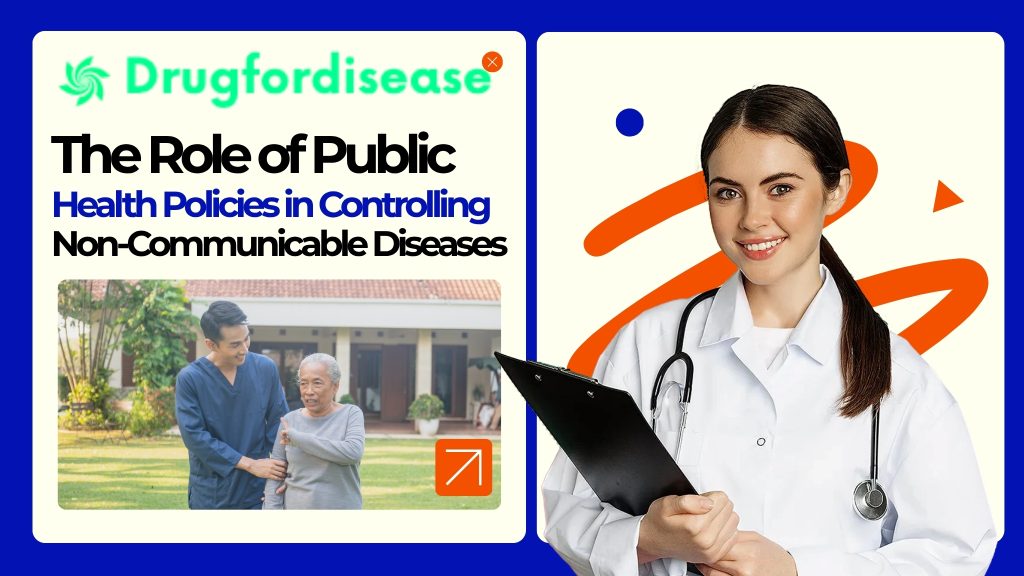Non-communicable diseases (NCDs) such as heart disease, diabetes, and cancer are major health challenges worldwide. Unlike infectious diseases these diseases are caused by a combination of the following; lifestyle, environmental and genetic factors. With an increasing global burden of NCDs, the presence of public health policies is essential in curbing the epidemic, as well as limiting its effects. In this article, we’ll explore the role of public health policies in tackling non-communicable diseases, focusing on their preventive measures, strategies, and the significant role organizations like DFD play in improving public health outcomes.
What Are Non-Communicable Diseases (NCDs)?
Non-communicable diseases are a group of medical conditions that are not transmitted from person to person. Rather, they come about due to the course of time and are often as a result of poor eating habits, insufficient physical activities, use of tobacco, and the intake of alcohol in amounts that are beyond normal.
The typical NCDs are:
- Cardiovascular conditions (such as heart disease; stroke)
- Chronic respiratory evils
- Cancer
- Diabetes
They have been responsible for causing most deaths in the world, and pose a great problem to the health system, economy, and the quality of life of people.
Why Public Health Policies are Essential when it comes to NCD Control?
Public health policies are essential in controlling non-communicable diseases for several reasons. The application of effective policies to the prevention of NCDs focuses on eliminating the causes of them, encouraging a healthier lifestyle, and decreasing the general prevalence of the health issues.
It is because of this that such policies are essential:
1. Encourage Healthy Life Style Decisions
Public health policies aimed at controlling non-communicable diseases focus on promoting healthier lifestyle choices. Governments can infer and avoid the development of such diseases by promoting exercise, nutrition, and by quitting smoking.
As an example, the marketing of unhealthy food, tobacco, and alcohol can be an important approach since such policies can diminish the consumption of these risk factors considerably. DFD is supportive of such policies so that the health outcomes of populations are improved.
2. Increase the Participation of People into Public Awareness
Effective methods to curb Ncds are educational and awareness programs that can also be considered to be one of the most potent ways to control Ncds. Included in the public health policies are the awareness programs on the danger of smoking, poor diets, and a sedentary lifestyle. Through these campaigns, people are informed about how to prevent non-communicable diseases, leading to better health choices.
As an illustration, to restrain Ncds, Dfd has been determined to educate people on the significance of consistent exercise and healthy diets through its mission statement.
3. Health Services and Early Detection
Good public health policies make healthcare services such as screenings and diagnostic tools available to all people. Diagnosing NCDs, including cancer and diabetes at an early stage in one or another can save a lot and positively impact diseases as a whole.
Governments usually partner with organisations, such as DFD, by making sure that poor groups can afford health services, which will help them to detect their possible NCDs in early stages of development.
4. Risk factor’s regulation
Another important feature of the public health policies lies in the regulation of the risk factors of NCDs. Taxation of the sweetened beverages, ad ban of the tobacco products, alcohol sale norms are some of the measures that can be dictated by the government to curb the propensity of engaging in the behaviors that lead to the development of the NCDs.
Policies aimed at creating “healthier environments” are key to reducing the risk of non-communicable diseases, and DFD advocates for such regulations globally.
Effective Strategies for Controlling Non-Communicable Diseases
A mixture of various methods usually works as a public health policy to regulate NCDs.
The best of them are the following:
1. Prevention and Health Promotion Programs
- Health promotion interventions offered by the public health organizations are large-scale ones to prevent the development of NCDs.
- These interventions tend to dwell upon better dieting, more physical activities and less alcohol.
- DFD also works with the NGOs and governments to support such programs on a regular basis to spread it to various communities.
2. Better access to Healthcare
- The provision of quality healthcare to all is a crucial factor that leads to early diagnosis and treatment of the NCDs.
- Policies are supposed to be aimed at affordable healthcare particularly in underserved regions.
- The DFD is supportive of efforts aimed at reaching out to individuals, who are at risk of not receiving quality healthcare.
3. Health Education Advocacy
- Education and advocacy on health are a massive trove of NCD prevention.
- People will be informed on the necessity of having a healthy style of life through media, schools and through community projects.
- DFD is passionate about advocacy, and works to ensure more policies put emphasis on the prevention of NCD.
4. Data-collection and Surveillance Surveillance and data-collection National insurance surveillance and data-collection
- To be able to monitor trends and design interventions in areas of health to the population at large, governments must have data on NCDs.
- The process of data collection enables policy-makers to evaluate the success of the existing programs and incorporate changes, when necessary.
- DFD applies evidence-based knowledge as a way to guarantee that health policies are having tangible impact.
What can be done to have a better future through NCD prevention?
This is because a healthier future cannot be reached without the community of government, healthcare providers and individuals working to make it happen.
The following are some tips of how to move on:
- Even impose better laws on unhealthy foods.
- Make an investment into the infrastructure of public health and particularly in the low-income regions.
- Partner up with such organizations as DFD in order to expand on awareness and prevention efforts.
- Promote community engagements into health-based practices.
Frequently asked questions (FAQs)
The most common non-communicable diseases include cardiovascular diseases, diabetes, chronic respiratory diseases, and cancer. These are lifestyle-related diseases, commonly linked to diet, physical activity, and smoking.
Public health policies can help by promoting healthy lifestyles, regulating risk factors, improving healthcare access, and raising awareness about the prevention of non-communicable diseases.
DFD supports policies that reduce NCD incidence, promotes awareness on healthy lifestyles, and collaborates with governments and health institutions to improve healthcare affordability.
Non-communicable diseases put heavy pressure on healthcare systems, harm economies, and affect individuals by causing premature deaths, disabilities, and costly treatments — reducing overall societal welfare.
Yes, they can be prevented with lifestyle changes such as healthy eating, regular physical activity, quitting smoking, and limiting alcohol. Public health policies play a key role in supporting these changes.






